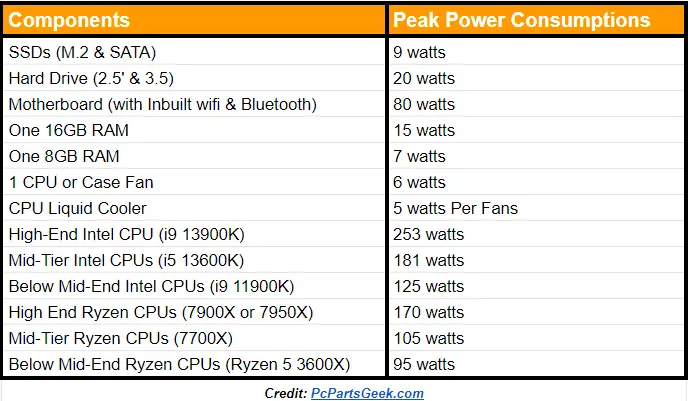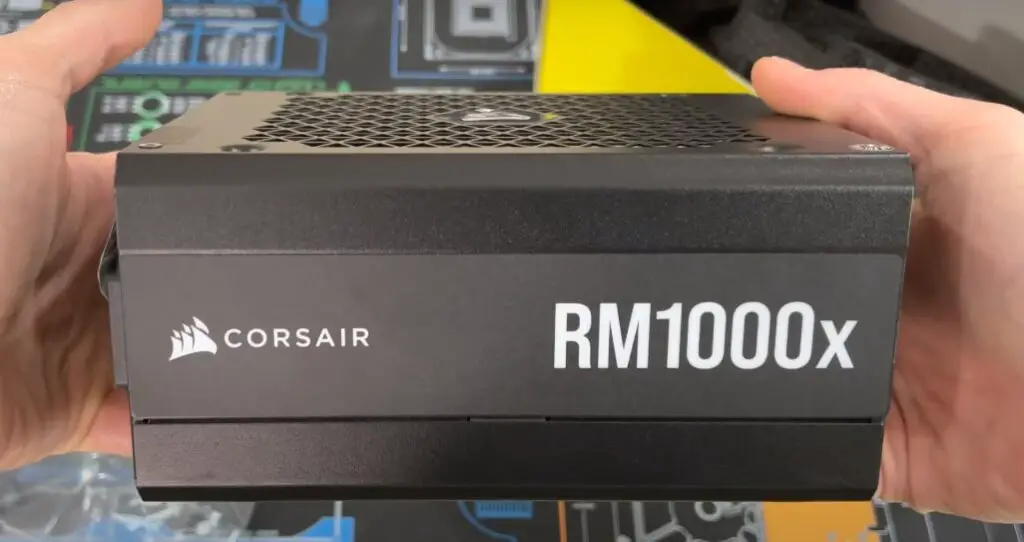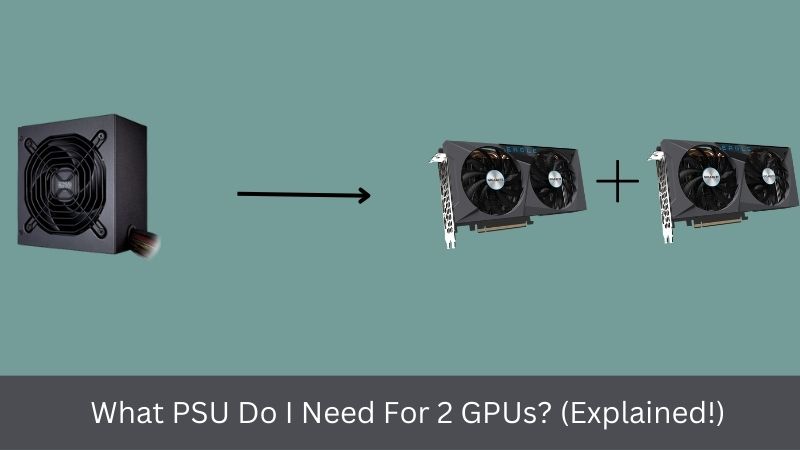Whether you want to use multiple monitors or improve your system performance, you have to install two GPUs inside your PC.
Before installing two GPUs in a PC, many users ask what PSU they require and whether their existing PSU is enough for two GPUs or not.
If you want to install two GPUs in your PC, you need to check three things on PSU: whether the PSU can supply enough power, whether the PSU has high PSU efficiency, and whether the PSU comes with the required number of PCIe cables.
If the Power Supply lacks any of these things, then installing two GPUs in the system can cause different problems.
In this guide, you will learn what wattage, efficiency, and how many PCIe connectors you require to install two GPUs inside your PC.
Wattage
How much PSU wattage is required for installing two GPUs in a PC depends on multiple factors, such as the power requirement of the GPUs and other components and whether you will overclock or not.
If you install two mid-range GPUs in your PC, then a 750W PSU from a reputed brand should be sufficient in most cases.
However, if you wish to install two high-end GPUs, then you need more than a 750W PSU.
For instance, if you want to install two RTX 4090 GPUs, then you at least require a 1500W PSU.
Except for the GPU, there are other PC components also that require a lot of power, and the table below will give you the exact idea about this-

Now, to quickly figure out how many PSU watts you need for dual GPUs and other components, you can visit the PCPartsPicker website.
After visiting this website, you can choose all the components that you are using, and this site will give you the estimated power wattage.
This approximation lets you determine what PSU wattage your system needs.
However, if you plan to overclock your components, then pick a PSU with an additional 100W.
For instance, if all your components require 750W in total, then you should select a PSU with 850W or above.
Efficiency
PSU efficiency is an important parameter we need to check, especially when installing two GPUs in the system.
A Power Supply takes AC power from the wall socket and converts that AC power into DC power.
The term PSU efficiency refers to the amount of power that a PSU converts into DC power as a percentage of the total power drawn from the AC power source.
Good PSUs have the 80 Plus certifications; this 80 Plus indicator means the PSUs are 80 Plus efficient.
These 80 Plus PSUs are further categorized into different levels, including- 80 Plus White, Bronze, Silver, Gold, Platinum, and Titanium. Learn more about these- different PSU efficiency levels.
The higher the PSU efficiency levels, the less energy will waste as heat, minimizing your electricity bills. On the other hand, the more efficient PSU you will buy, the more money you have to put in.
So, if you install two mid-range GPUs, then pick a Power Supply with at least 80 Plus Bronze.
However, if you install two high-end GPUs, then you need to use a PSU with 80 Plus Gold or higher efficiency.
PCIe Cables
Installing two GPUs in the system will require multiple PCIe cables, and you have to ensure that the PSU has sufficient PCIe cables.
How many PCIe cables will you need to install two GPUs in a system? That depends on the power requirement of the GPUs and the number of PCIe ports the GPU has.
To figure out the required number of PCIe cables, you can read- whether your GPU needs one, two, or more PCIe cables.
If you install two GPUs requiring one PCIe cable each, then you need a PSU with two PCIe connectors.
However, if your GPU requires two PCIe power connectors each, then you need a PSU with four PCIe connectors.
Is My PSU Enough For 2 Graphics Cards?
Whether your PSU is enough for two GPUs or not depends on the power requirements of your system and the required number of PCIe cables.
Firstly, you must check how much power each graphics card and other system components require, including CPU, motherboard, RAM, and storage drives.
If your PSU can deliver a sufficient amount of power to all PC components, then next, you have to check whether it has a sufficient number of PCIe cables or not.
If the Power Supply has a sufficient number of PCIe cables, then you can pair two GPUs inside your system.
The only solution to this problem is upgrading to a new PSU with sufficient PCIe cables.
Best PSU For 2 Graphics Cards
You can use any PSU for installing two GPUs if the PSU has an 80 Plus Gold efficiency rating, a sufficient number of PCIe cables, and can deliver enough power to all the PC components.
Besides these things, another important factor you need to check is the brand.
A PSU from a reputed brand has all the necessary protections, including- Power Surging, Overvoltage, under voltage, short circuit, and over temperature.
Some of the popular PSU brands are- EVGA, Seasonic, Cooler Master, NZXT, Corsair, etc.
I have been using the Corsair RMX series PSU for the last 1.5 years, which gives an impressive performance.

If you want to install two GPUs in your system, then the Corsair RMX Series PSUs are your best choice.
You can check the price of this Corsair RMX PSU on Amazon.
This PSU is available in 550W, 650W, 750W, 850W, 1000W, and 1200w ranges, so you can calculate your system power requirement and then pick the correct wattage.
Moreover, this PSU has 80 Plus gold efficiency ratings and comes with 3 dual pin PCIe cables which will be enough for installing two GPUs.
Apart from that, more than 5000+ users give their posting reviews about this PSU which clearly indicates this product is good.
Wrapping Up
The gist of the entire discussion is when installing two GPUs in your PC; you need to choose a PSU that can deliver sufficient power, that has an adequate number of PCIe cables, and has good efficiency levels like 80 Plus Gold or higher.
If you have any other questions, ask me in the comment section, and I will reply.
